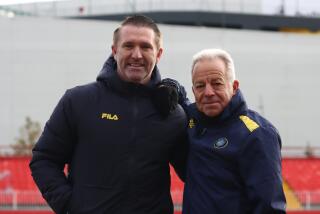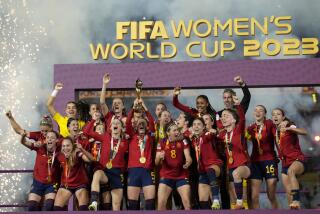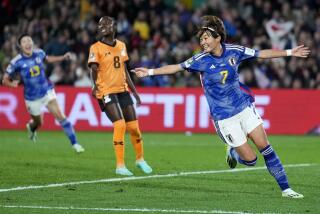Lions Haven’t Roared Since ’66
- Share via
No country is more obsessed with--and vexed by--its one glistening moment of World Cup glory than England.
In bookstores from London to Manchester, the shelves are glutted with tomes about 1966, the year England hosted the World Cup, and won it.
For the record:
12:00 a.m. June 10, 1998 For the Record
Los Angeles Times Wednesday June 10, 1998 Home Edition Sports Part C Page 7 Sports Desk 1 inches; 28 words Type of Material: Correction
Soccer--The individual schedules of games with each World Cup group in Tuesday’s special section listed Eastern times. The complete schedule of games on Page S8 listed the correct Pacific times.
There are books about Alf Ramsey, the deified manager of that victorious team; books about the championship game against West Germany; books about whatever became of the heroes of ‘66; books about legacy of ’66 and England’s collective pangs of guilt over never again matching that standard in 32 years after the fact.
Before England hosted the 1996 European championships, an official song for the tournament was commissioned. Titled “Three Lions” after the emblem every England player wears over his heart, the song is not so much a rousing call to arms as a bittersweet coming to terms with the shortcomings of English soccer, post-1966:
Three lions on a shirt
Jules Rimet still gleaming
Thirty years of hurt
Never stopped me dreaming
A best-selling video in England a couple years back was a documentary study of the national team’s failed bid to qualify for the 1994 World Cup. The English magazine Total Sport recently assessed the 50 Most Heartbreaking Moments in Sport and accorded two slots--No. 18 and No. 1--to England’s loss to Germany in penalty kicks in the semifinals of the 1990 World Cup.
Number 18 was the defeat itself; No. 1 was the sight, now permanently etched into the English psyche, of star midfielder Paul Gascoigne breaking into tears after receiving his second yellow card of the tournament--making him ineligible for the World Cup final, for which England never quite qualified.
Gazza’s Tears. For eight years, those two words conjured the same mixed emotions in the mind of every English fan--tears of nationalistic pride, tears of coming so close to purging the ghosts of ’66 yet, ultimately, falling agonizingly short.
Now, however, “Gazza’s Tears” has taken on new meaning in England, ominous for a country that had just allowed its wounded psyche to toy with the brave idea that, yes, maybe, this might be the year.
On the last weekend of May, Gascoigne was moved to tears again, this time after the bombshell decision by England Coach Glenn Hoddle to cut the hero of 1990--and the most creative player on the English roster still--from the ’98 World Cup squad.
Gascoigne has long been the clown-prince of British soccer, a drinker and carouser in the grand tradition of George Best, only wholly lacking Best’s common sense and emotional stability.
“If only Gazza can hold it together for a month” was the collective hope of a nation as it braced for France 98. But he couldn’t, even after warnings from Hoddle after a tabloid frenzy over Gascoigne’s chain-smoking, drinking and kebab-binging habits in late May.
Gascoigne admitted he fell off the wagon two days before being dropped from the squad. “Yes, I was drunk,” Gascoigne told the London newspaper the Sun. “I got drunk quite quickly--I’d not had a drink in nine days.”
When Hoddle called Gascoigne to his hotel room to give him the news, Gascoigne burst into tears and a cursing, furniture-kicking tantrum--eventually requiring two England players to restrain Gascoigne and remove him from the room.
For the record, Hoddle said he was cutting Gascoigne “totally on his fitness levels and the form he’s been in during the last three matches. . . . It’s 1998 and you have to be an athlete. I watch Germany and Brazil and they have excellent players but also athletes. Unfortunately, Paul did not come into that category in the last days.”
The subsequent shock throughout the country was best articulated by one of Gascoigne’s former teammates, Garry Mabbutt, who called Hoddle’s decision “quite incredible, amazing. We have three unpredictable players in the England squad who can do extraordinary things on the ball--Darren Anderton, Steve McManaman and Gascoigne.
“Gazza creates fear across the world. Even at 75% he can do things other players cannot.”
Without’s Gascoigne’s playmaking intuition, England’s midfield is now reduced, largely, to a collection of hard-working mechanics--save McManaman, who is more a free-wheeling winger than a central-based quarterback.
It also heightens the burden on striker Alan Shearer to carry the offensive load--provided England discovers a way to get him the ball.
Despite a world-class goalkeeper in David Seaman and a defense that hasn’t yielded a goal in months, England will be hard-pressed to withstand the likes of Germany and Italy without anything surprising emanating from the midfield.
Already, the country across the channel has scaled back its World Cup aspirations. Within hours of Gascoigne’s ouster, bookmakers in London lengthened the odds against England winning the cup from 7-1 to 8-1--with the odds of England getting eliminated in group play shortened from 4-1 to 7-2.
As they say in the long tormented Home of Football, England expects.
(BEGIN TEXT OF INFOBOX / INFOGRAPHIC)
GROUP G
The Schedule
MONDAY
England vs. Tunisia, 8:30 a.m. (ESPN2, Ch. 34)
Romania vs. Colombia, 11:30 a.m. (ESPN, Ch. 34)
JUNE 22
Colombia vs. Tunisia, 11:30 a.m. (ESPN, Ch. 34)
Romania vs. England, 3 p.m. (ESPN, Ch. 34)
JUNE 26
Romania vs. Tunisia, 3 p.m. (ESPN2, Ch. 34*)
Colombia vs. England, 3 p.m. (ESPN, Ch. 34)
* Highlights
More to Read
Go beyond the scoreboard
Get the latest on L.A.'s teams in the daily Sports Report newsletter.
You may occasionally receive promotional content from the Los Angeles Times.






